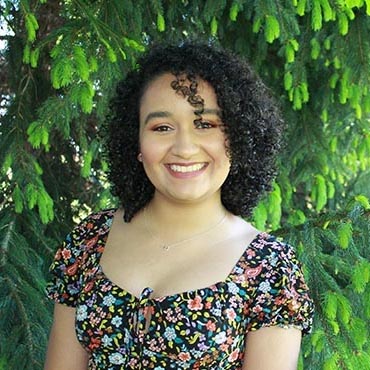Engineering student to research Salmonella with Erickson Discovery Grant
5/29/2020
By Sarah Small
UNIVERSITY PARK, Pa. — Cassandra Nuñez, a Penn State electrical engineering rising junior, recently received a 2020 Erickson Discovery Grant to study the motion of Salmonella under antibiotic and heat stress.
The Erikson Discovery Grant Program was established to support Penn State undergraduate students during the summer as they pursue original projects under the mentorship of a faculty member. The grant provides each recipient with funding of $3,500 to support his or her summer research.
Other studies have proven a correlation between the increase in virulence, or the severity and harmfulness of, Salmonella and an increase in magnesium transport proteins: with an increase in magnesium transport, cells have been shown to be more protected against factors such as nitro-oxidative stress, heat shock and overall virulence. With this understanding, and under the mentorship of Aida Ebrahimi, assistant professor of electrical engineering in the School of Electrical Engineering and Computer Science, Nuñez will study the motion of various strains of Salmonella that have varying degrees of magnesium transport proteins in their membranes, under heat shock and antibiotics, respectively.
To conduct this research, Nuñez will use speckle imaging, which uses a setup of laser, lens and a CMOS camera to capture an image created by laser light scattering. The laser shines through the sample, the sample scatters the laser light and the camera captures the image. This scatter is called speckle. As the cells in the sample move, the speckle pattern fluctuates, providing information on cellular motion.
“This research is super important because studies on motion of Salmonella cells under these conditions have never been done before,” Nuñez said. “Understanding the basic mechanisms that allow Salmonella to survive and adapt to various environments is vital to understanding the best ways to eliminate it and protect against salmonellosis. Additionally, because there has been such an issue with antibiotics being over prescribed, more and more antibiotic resistant strains of Salmonella have been popping up. Being able to understand the basic and underlying mechanisms behind these changes can eventually lead to developing more efficient therapeutics.”
According to Nuñez, the most exciting aspect of this research is its interdisciplinary nature. She said she first became fascinated with the ways in which electrical engineering could help with understanding biological issues while taking a summer class while in high school. The course was a biomedical engineering class taught by an electrical engineer at the University of Connecticut.
“[In the class,] we hooked ourselves up to a machine that allowed us to see the electrical signal given off when we flexed our arm muscle,” she said. “It was amazing to me. Electrical engineering is a field that has almost limitless applications, and I knew that the information I learned in classes can be applied to the body to tell us things that we might have never known otherwise.”
Nuñez has known that she wanted to be a professor since she was in high school, a goal that influenced her choice of Penn State for college.
“I chose Penn State because it is an amazing research university,” she said. “I knew that I wanted a big school because with big schools come huge opportunities.”
Nuñez jumped into two of those opportunities right away, as she was selected for both the Millennium Scholars Program and the Latinx Leadership Institute. She credits both of these programs with helping her achieve her research goals, including receiving the Erickson Discovery Award.
“The Millennium Scholars Program gives me connections to summer research opportunities, labs on campus and graduate school connections,” Nuñez said. “The Latinx Leadership Institute is an incredible group of student leaders who helped me fight impostor syndrome. To me, it is almost impossible to reach your goals without a solid foundation underneath you, supporting you and lifting you up. Both of these organizations helped do that for me.”
She also received support and encouragement from her mentor, Ebrahimi, which, according to Nuñez, helped to make this research and the successful application for funding possible.
“At the beginning of my sophomore year, I found Dr. Ebrahimi's lab, which was exactly what I had been imagining: a lab that combines my love of biology and electrical engineering and materials all in one,” Nuñez said. “Even better to me was that Dr. Ebrahimi was a minority woman in research just like me. She gave me the freedom and ability to pick my own project to make sure it was something that I am interested in and would be proud to put my name on.”




